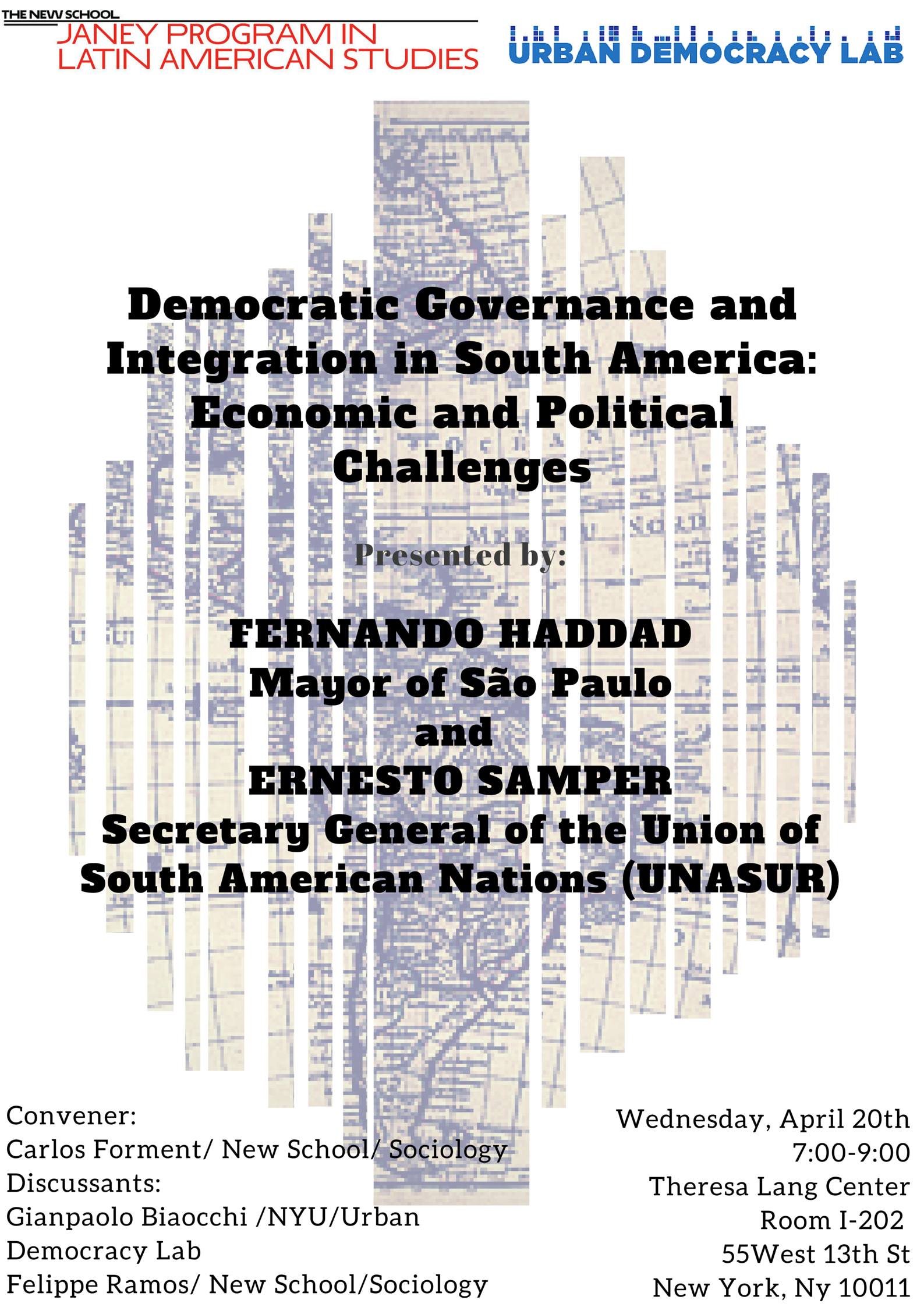Mr. Fernando Haddad, mayor of Sao Paulo, has been described by The Wall Street Journal as “an urban visionary,” and by The New York Times as the leader of “a sweeping movement” that is aimed at achieving “something once thought impossible: challenging the supremacy of the automobile”. A 53-year-old scholar with a doctorate in philosophy who is committed to ensuring that citizens are able to exercise “their right to the city,” mayor Haddad is taking the city and metropolitan region of Sao Paulo, with a population of 20 million and among the most complex and dynamic socio-economic and political areas of the global south, into the twenty-first century. During his talk mayor Haddad will address some of the challenges confronting Sao Paulo—affordable public transportation, egalitarian usage of public spaces, and the socio-political inclusion of marginalized and stigmatized populations (street hawkers, homeless, drug addicts, sex workers, transgender).
Mr. Ernesto Samper, former President of Colombia (1994-1998), is currently Secretary General of the Union of South American Nations (UNASUR), a regional multilateral organization that was created in 2008 by progressive presidents at the height of the ‘pink-tide’ when the continent was enjoying unprecedented economic growth. UNASUR remains successful. However, it must now maneuver in a very different economic, political and social landscape (stagnation, pro-market governments and social dislocation). How can UNASUR continue to advance and deepen regional integration under the new and challenging scenario in South America? During the conference, UNASUR’s Secretary General will address these and other timely topics.
Carlos A. Forment. New School for Social Research in the Departments of Sociology and Politics, and Director of the Janey Program in Latin American Studies. He is advancing on a book-length manuscript: Everyday Civility, Ordinary Politics and Post-Democratic Life in Argentina in the Wake of Marketization: The Emergence of Plebeian Citizenship Across the Global South. Several chapters from this book have been published recently in Current Anthropology and Anthropological Theory. Forment is author of La Formacion de la Sociedad Civil y la Democracia en el Peru (2012, Universidad Catolica), Democracy in Latin America: Civic Selfhood and Public Life, vol I; Mexico and Peru, (The University of Chicago Press, Second Edition, 2013) and co-edited Shifting Frontiers of Citizenship: The Latin American Experience (Brill, 2013). His Everyday Nationalism in Nineteenth Century Latin America is under contract with The University of Chicago Press. Forment has also published in Nexos, Open Democracy and other non-academic magazines.
Gianpaolo Baiocchi, associate professor at NYU Gallatin and director of the Urban Democracy Lab, is a sociologist and an ethnographer interested in questions of politics and culture, critical social theory, and cities.He has written about and continues to research instances of civic life both in his native Brazil and in the US. He is a leading social science expert on participatory democracy who has for the last decade engaged public officials, voluntary organizations, and policy makers on the practice and implementation of participatory processes. His books and academic articles on citizen engagement on budgetary matters (“participatory budgeting are among the most cited in the scholarly literature and have been published and translated in several languages. As one of the founders of the Participatory Budgeting Project, he has worked with city officials in several US cities, and has presented his work to the World Bank, to the UNDP, HUD, and to both the World and US Social Forums. His work has appeared in specialist and general-audience publications from The American Sociological Review and American Journal of Sociology to The Boston Review and Le Monde Diplomatique.
Felippe Ramos has developed his academic work on Latin America democracy, development and integration and has recently published the book “Brazilian Foreign Policy and the construction of South America” (in Portuguese). He has taught at the Federal University of Bahia and Central Arizona College. More recently, he worked for the Mission in Venezuela of the Brazilian state-led think tank Institute of Applied Economic Research (Ipea). He is currently Executive Director of BRICS Overseas and carries out his doctoral research at The New School on State, democracy and development in the region.
PLEASE RSVP

